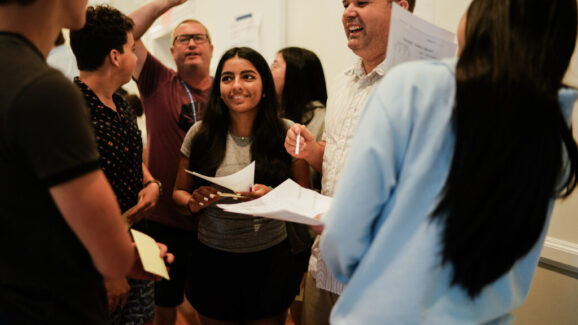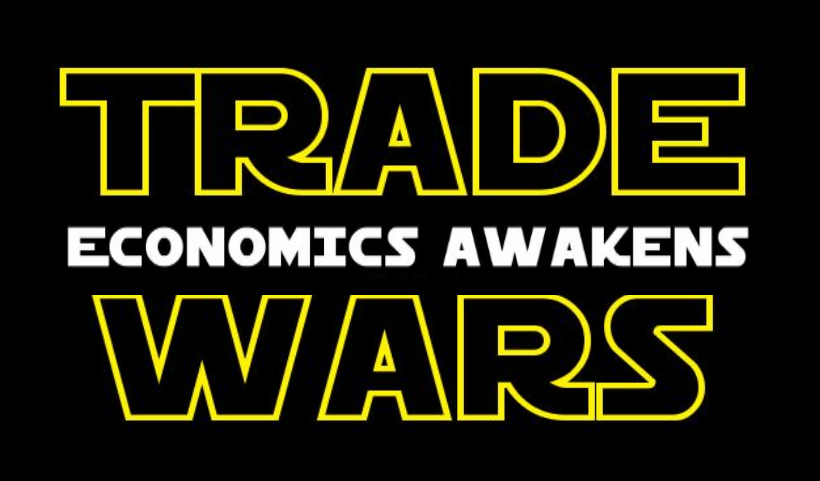Top 5 Econ Lessons For Your Classroom

- >
- Teachers
- >
- Top 5 Econ Lessons For Y…
October 30, 2024
By Jamie Wagner, Professor and Economics Teaching Fellow with the Foundation for Teaching Economics and an Associate Professor at the University of Nebraska, Omaha. In this series of blogs, Jamie writes passionately about her love of teaching economics.
To close out National Economic Education month, I want to share my recommendations for five top lessons you should add to your class IMMEDIATELY!
My most overused phrase in my course is, “This is my favorite topic/activity.” I love teaching economics with FTE and at the University of Nebraska at Omaha. I have so much fun because I enjoy using activities to teach concepts. It’s boring for me (and my students!) to stand up front and drone on and on like Ferris Bueller’s teacher (sorry, a Gen X reference).
On the first day of class, I start with an activity that gets students moving right away. They quickly realize that my class is not one where they just sit and zone out. I think it works—my students enjoy my class, and many continue taking economics courses. And just as important, I’m having fun! Happy professor, happy life. So here are my favorite economics lessons and activities that I recommend you should try with your students who have that glazed eyes look when you teach. Both your students and yourself will appreciate the engagement and fun these activities bring to your class.
The Ultimatum Game
I start each semester with this activity. Students are split into equal groups, and one group is sent into the hallway. The remaining students decide how to split 10 extra credit points (the game uses money, but any divisible and desirable prize works). The groups then swap, and the students either accept or reject the proposed split.
This activity provides rich content for the rest of the semester. Students make a choice and there are consequences to that choice. It also introduces a bit of behavioral economics, which students enjoy. The lesson concludes with the idea that societies where markets are more prevalent in daily life have to more equitable splits. Discussions then follow regarding economic systems, incentives, and economic institutions.
The Fish Game
This is super simple, quick, and effective. I use this activity to begin discussing market failures. Property rights are an important component of a thriving economy, and without them, resources can easily be depleted (the tragedy of the commons). In this activity, students fish to earn candy (1 piece in the first round and 2 pieces in the second). It’s best for students to wait until the second round to get more candy, but if they wait, someone else will take that fish. Therefore, all the fish are depleted in the first round. You then repeat this game with clear property rights—students can only fish in a designated area. As a result, they make more money (candy), and the fish are not depleted. This lesson takes about 10 minutes but offers valuable insights into property rights, environmental issues, and incentives.
In the Chips
Every teacher needs a supply and demand activity—here is yours! Students buy or sell computer chips. Ultimately, the game shows that neither buyers nor sellers set prices; it is the interaction between buyers and sellers that determines prices. The game also demonstrates that buyers compete against other buyers, which drives prices up—as in an auction. Similarly, sellers compete against other sellers, which drives prices down.
I run this activity in my class to kick off supply and demand. Students enjoy it. They are out of their seats and moving, and whenever competition is involved, students are eager to participate. I offer extra credit as prizes, but you could easily use candy or something else they find exciting.
Cartels and Competition
This is a favorite of mine because my students become so invested in this game. It uses an oligopoly situation to show why cartels and price fixing do not work. Students tend to try to outsmart their peers, and this activity highlights that dynamic perfectly. In addition to bringing excitement and energy to my class, it reinforces the economic principle that “profit is the motivator, competition is the regulator.”
Magic of Markets
This is a fan favorite! Other names for this activity include the “Trade Game”, “The Dollar Trade Game”, or “Bag Game”. It has so many names because it’s simple, exciting, and widely used by teachers. This game works for almost every grade level; I have used it with elementary students, middle grades, high school students, college courses, and adults. It’s effective, and everyone loves it. The ultimate lesson—that voluntary trade creates wealth—is a concept economists universally agree upon!
Students receive a brown paper bag with a $1 item inside. They secretly look at and rate the item on a scale of 1 to 5 (1 being the worst and 5 being the best). Through rounds of trading, students become increasingly satisfied with their items. This game illustrates the power of voluntary trade. You can have students bring in a $1 item or collect tchotchkes from businesses and conferences to add to your own bags.
If running activities fills you with trepidation, enroll in one of FTE’s professional development programs. The Economics for Teachers program features all these activities and, what is especially unique, has instructors modeling the activities with high school students. You leave the program with the expertise needed to incorporate these games into your class. And, if you do attend, you might get me as your professor!
Honorable mentions:

Making Economics Meaningful for Students
December 19, 2025 The Fund for American Studies’ Liberty and Leadership podcast features FTE’s own Amanda Stiglbauer, a longtime member of our…

The Economic Way of Thinking: The Key to Financial Literacy
April 10, 2025 Professor Jamie Wagner discusses how economics is the key to financial literacy. She is a Professor and…

Trade Wars – Economics Awakens (repost)
FTE is re-posting this article written during Trump 1.0. Much of what Professor Malek had to say about tariffs back…
